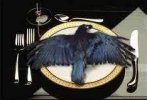今天是美国感恩节,美国人吃火鸡:
摩根大通银行总裁 Jamie Dimon 吃乌鸦:

On Tuesday, Nov. 23, Jamie Dimon said: "I made a joke the other day that the Communist Party is celebrating its 100th year - so is JPMorgan. I'd make a bet that we last longer."
Dimon added: "I can't say that in China. They are probably listening anyway."
He was speaking as part of a Boston College series of CEO interviews.
Then Jamie Dimon regrets twice what he said about CPP.
Jamie Dimon apologises twice after saying JPMorgan will outlast China’s Communist party
Financial Times
Jamie Dimon has issued two separate apologies to China after telling a group of US business leaders that JPMorgan Chase would outlast the Chinese Communist party. In a speech in Boston on Tuesday the bank’s chief executive had referred to the party’s 100th anniversary, remarking that JPMorgan was the same age. “I’ll make a bet that we last longer,” he said, adding: “I can’t say that in China. They are probably listening anyway.” The bank scrambled on Wednesday to mitigate any damage to relations with the country, where JPMorgan has spent decades laying the groundwork to take advantage of its growing prosperity.
First, Dimon issued a statement: “I regret and should not have made that comment. I was trying to emphasise the strength and longevity of our company.” Hours later he apologised again. “I regret my recent comment because it’s never right to joke about or denigrate any group of people, whether it’s a country, its leadership, or any part of a society and culture. Speaking in that way can take away from constructive and thoughtful dialogue in society, which is needed now more than ever.” Bonnie Glaser, a China expert at the German Marshall Fund, said: “If the apology was effusive, the Chinese Communist party might let it go.” She added that the longevity of the party “isn’t a topic that China likes to call attention to”. The Chinese embassy in Washington declined to comment. Dimon’s comments to the business forum came less than a week after he made a surprise one-day visit to Hong Kong, becoming the first Wall Street banking boss to go to the Chinese territory since the start of the pandemic. Leaders of global businesses that rely on operating in China for a large portion of revenues are typically cautious about commenting on Beijing. A number of foreign companies such as HSBC and law firm Mayer Brown have faced a backlash in China over perceived criticism. In 2019, Swiss bank UBS was excluded from some Chinese state-backed deals after one of its economists made a comment about “pigs in China” that was perceived as a slur. JPMorgan said Dimon acknowledged he “should never speak lightly or disrespectfully about another country or its leadership”. “During the discussion, Jamie made clear China and its people are very smart and very thoughtful,” the bank added, and that Dimon “strongly supports a constructive and detailed economic dialogue with China”. JPMorgan has operated in China since 1921, the same year the Communist party was founded. It has said that growth in the country represents one of the largest opportunities for the bank and its clients. JPMorgan this year won approval from Chinese regulators to run a wholly owned investment bank in the country, which was a landmark moment for foreign banks’ access to China’s financial sector. It also operates asset and wealth management joint ventures there. Dimon’s visit to Hong Kong prompted some consternation that the chief executive was granted a rare exemption from the city’s strict quarantine rules. JPMorgan has since said it will compensate staff who had to quarantine up to $5,000. Referring to tension between the US and China, Dimon said in Hong Kong that he was “not swayed by geopolitical winds” and he believed world leaders would work out “rational” solutions.
To eat crow means to admit a humiliating error one has made, to concede a humiliating defeat.
Crow is an unappetizing food, even listed in the book of Leviticus in the Bible as an animal that is not to be eaten. The phrase appears around 1850 in the United States, and is presumed to have been derived from a story that appeared in the Saturday Evening Post in 1850, about a farmer who is challenged by his boarders to eat a
crow. The original phrase was to
eat boiled crow. Today the term has been streamlined to
eat crow, related terms are
eats crow, ate crow, eating crow.



